Abstract
STUDY OBJECTIVE--This study aimed to examine in a general population the psychometric qualities of an instrument designed to measure positive and negative social experiences that had been developed in a clinical setting. DESIGN--The Netherlands monitoring project on cardiovascular disease risk factors, a large scale population based study (comprising 36,588 men and women aged 20 to 59 years) carried out in three Dutch towns (Amsterdam, Doetinchem, and Maastricht) offered the possibility of testing the strength of this instrument cross sectionally. MEASUREMENTS AND MAIN RESULTS--The social experiences checklist (SEC) which resulted from a research project on the quality of life of cancer patients was used. The independence of positive and negative experiences was confirmed. The reliability of both the positive and negative experiences dimension was good (Cronbach's alpha = 0.82 and 0.72 respectively). In accordance with the results of a study on cancer patients, the theoretically derived four dimensions in the experience of social support did not seem to be independent. The validity of the SEC was confirmed by Pearson correlations with neuroticism and coping styles. Neuroticism seemed to be negatively correlated with positive social experiences and was positively correlated with negative social experiences. The coping style of seeking information and direct action was positively correlated with positive social experiences. Coping by withdrawal was negatively correlated with negative social experiences. Women and highly educated people seemed to have more positive and fewer negative social experiences than men and people with less education. Younger people had more positive social experiences than older people. The oldest group in the study, those aged 50 to 59, reported fewer negative social experiences than any other age group. CONCLUSIONS--Similar results were found in a study of cancer patients. This underlines the usefulness of the instrument not only for cancer patients but also in survey research in a general population.
Full text
PDF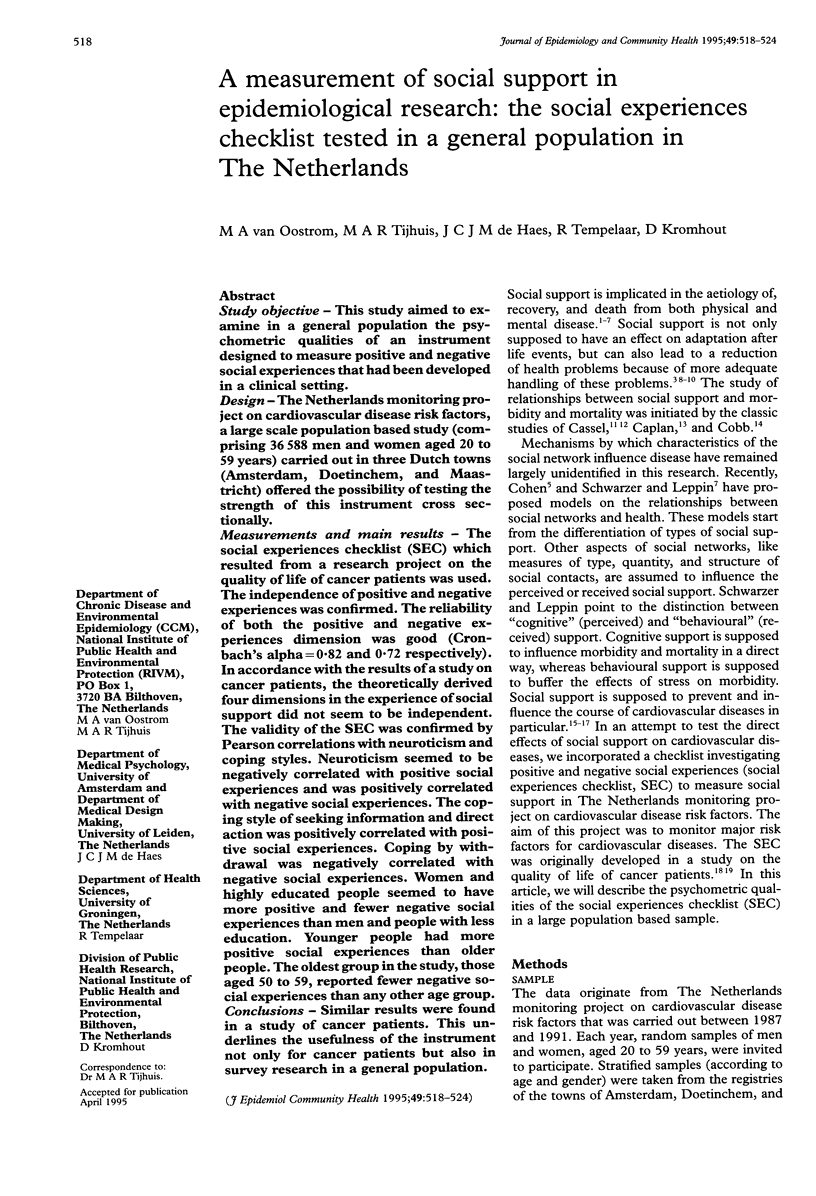
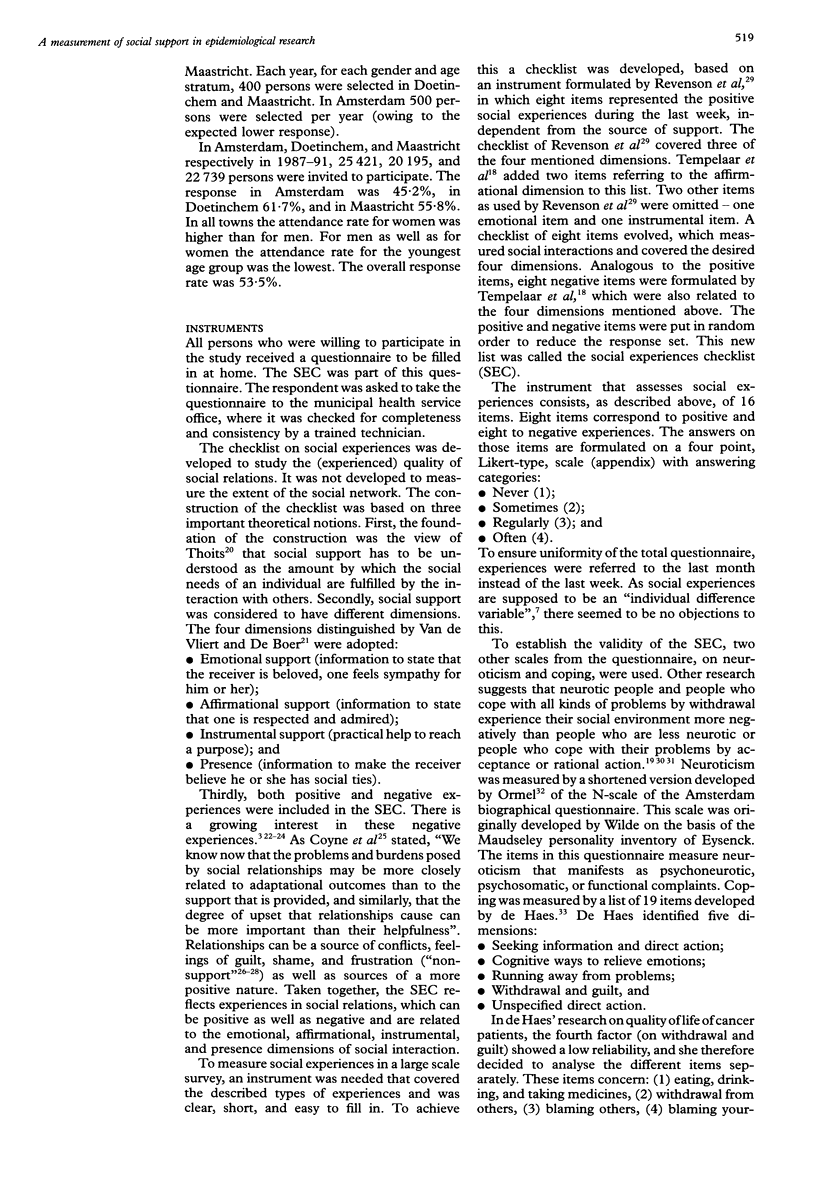
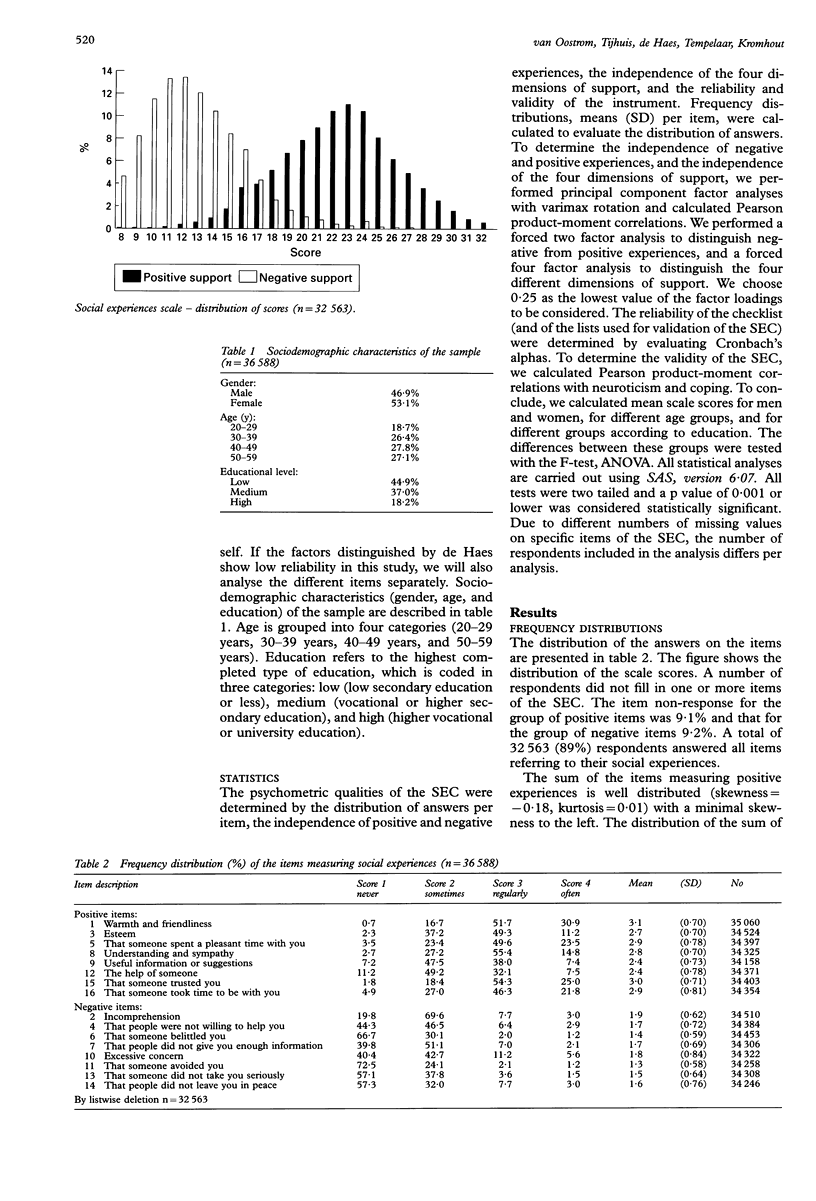
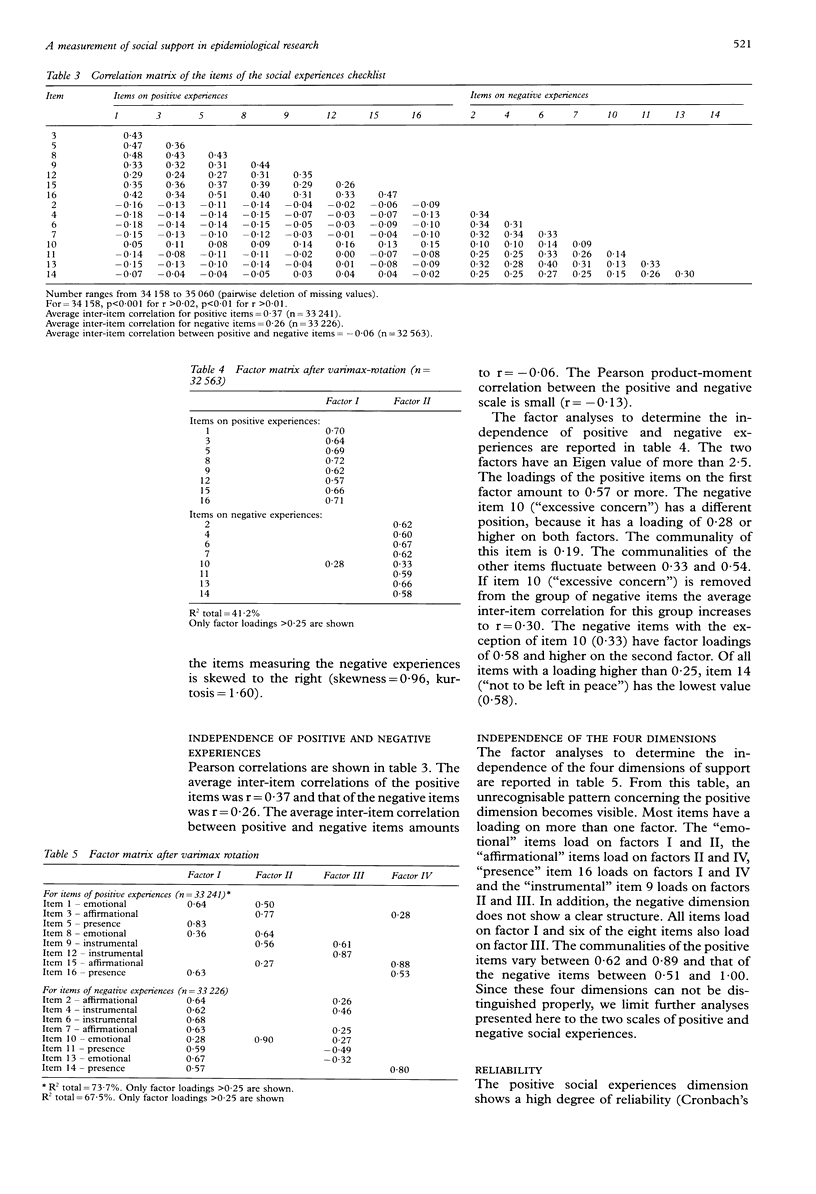
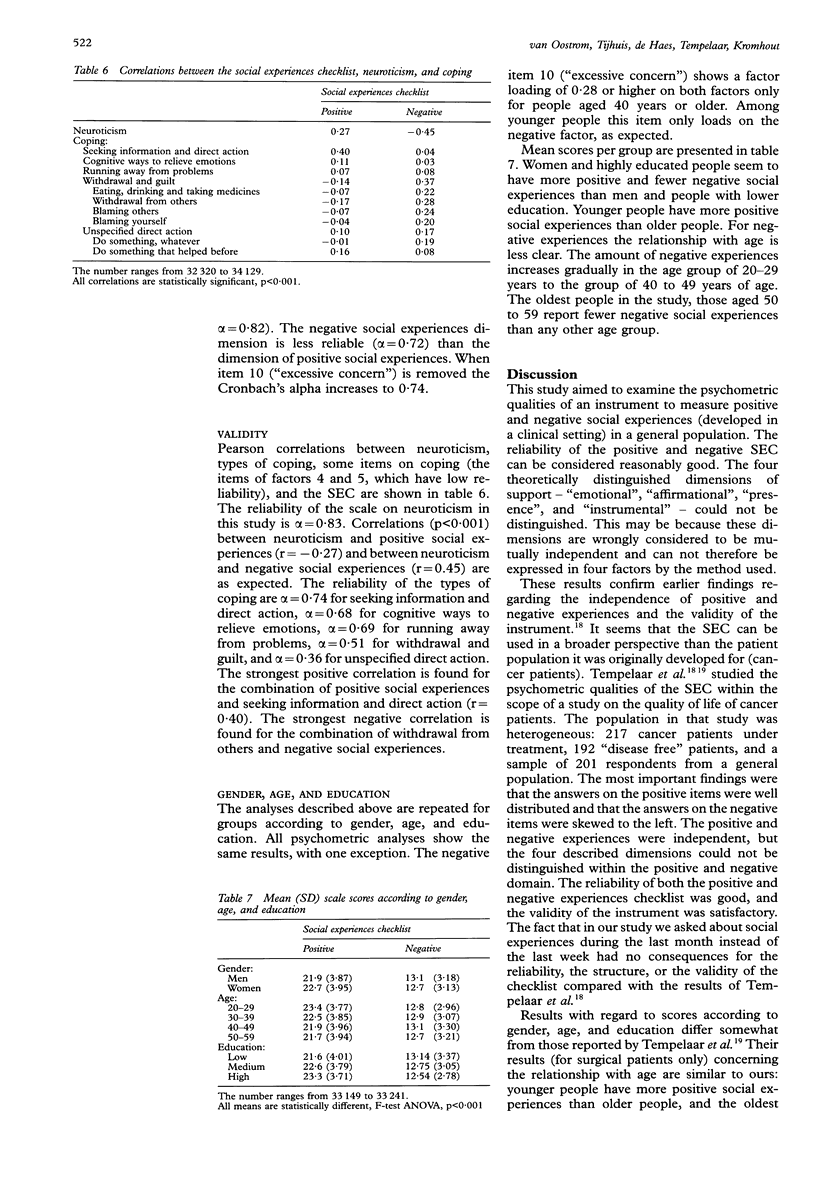
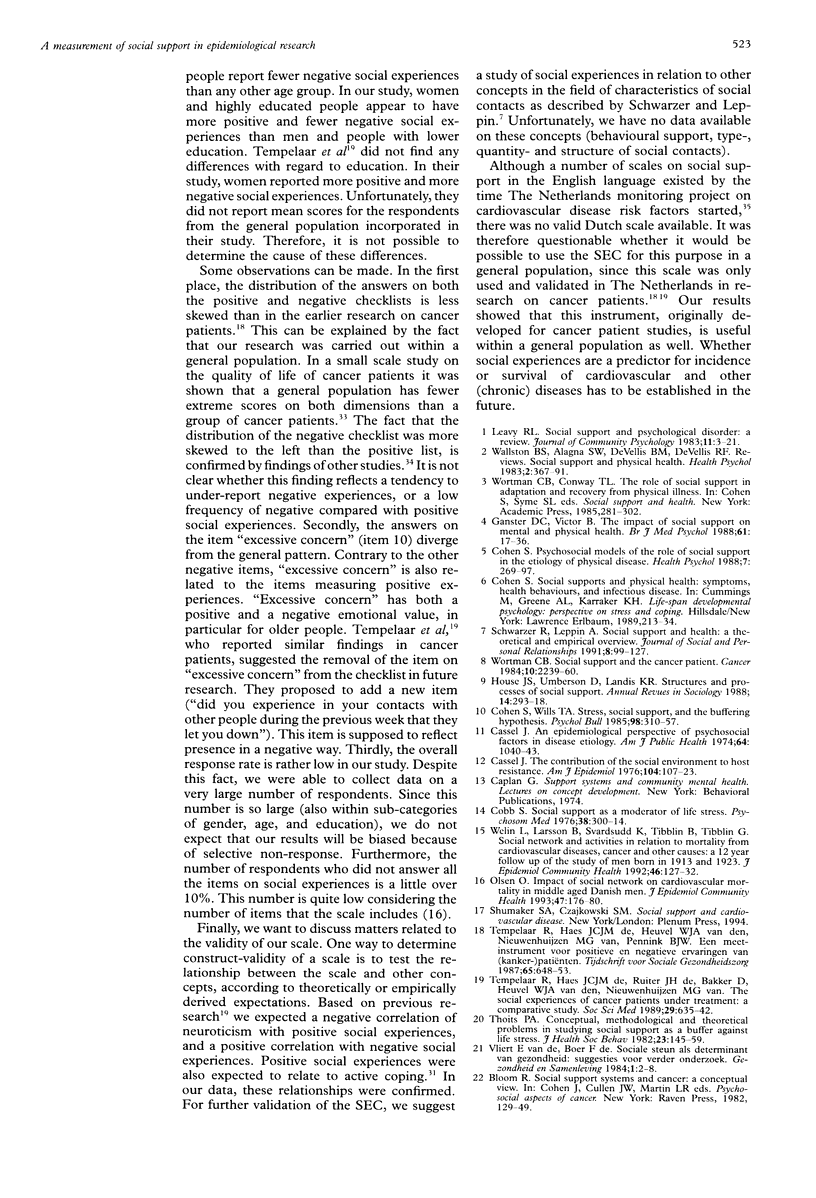
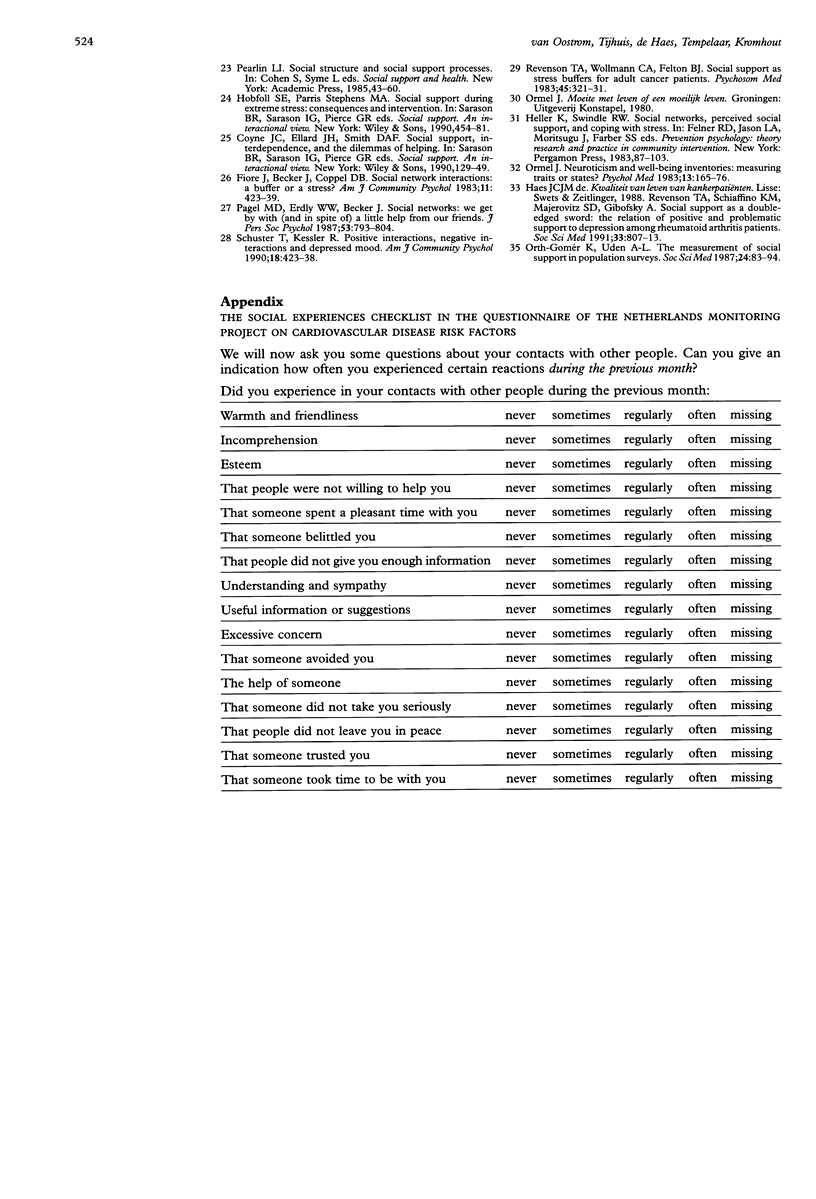
Selected References
These references are in PubMed. This may not be the complete list of references from this article.
- Cassel J. An epidemiological perspective of psychosocial factors in disease etiology. Am J Public Health. 1974 Nov;64(11):1040–1043. doi: 10.2105/ajph.64.11.1040. [DOI] [PMC free article] [PubMed] [Google Scholar]
- Cassel J. The contribution of the social environment to host resistance: the Fourth Wade Hampton Frost Lecture. Am J Epidemiol. 1976 Aug;104(2):107–123. doi: 10.1093/oxfordjournals.aje.a112281. [DOI] [PubMed] [Google Scholar]
- Cobb S. Presidential Address-1976. Social support as a moderator of life stress. Psychosom Med. 1976 Sep-Oct;38(5):300–314. doi: 10.1097/00006842-197609000-00003. [DOI] [PubMed] [Google Scholar]
- Cohen S. Psychosocial models of the role of social support in the etiology of physical disease. Health Psychol. 1988;7(3):269–297. doi: 10.1037//0278-6133.7.3.269. [DOI] [PubMed] [Google Scholar]
- Cohen S., Wills T. A. Stress, social support, and the buffering hypothesis. Psychol Bull. 1985 Sep;98(2):310–357. [PubMed] [Google Scholar]
- Fiore J., Becker J., Coppel D. B. Social network interactions: a buffer or a stress. Am J Community Psychol. 1983 Aug;11(4):423–439. doi: 10.1007/BF00894057. [DOI] [PubMed] [Google Scholar]
- Ganster D. C., Victor B. The impact of social support on mental and physical health. Br J Med Psychol. 1988 Mar;61(Pt 1):17–36. doi: 10.1111/j.2044-8341.1988.tb02763.x. [DOI] [PubMed] [Google Scholar]
- Leavy R. L. Social support and psychological disorder: a review. J Community Psychol. 1983 Jan;11(1):3–21. doi: 10.1002/1520-6629(198301)11:1<3::aid-jcop2290110102>3.0.co;2-e. [DOI] [PubMed] [Google Scholar]
- Olsen O. Impact of social network on cardiovascular mortality in middle aged Danish men. J Epidemiol Community Health. 1993 Jun;47(3):176–180. doi: 10.1136/jech.47.3.176. [DOI] [PMC free article] [PubMed] [Google Scholar]
- Ormel J. Neuroticism and well-being inventories: measuring traits or states? Psychol Med. 1983 Feb;13(1):165–176. doi: 10.1017/s0033291700050170. [DOI] [PubMed] [Google Scholar]
- Orth-Gomér K., Undén A. L. The measurement of social support in population surveys. Soc Sci Med. 1987;24(1):83–94. doi: 10.1016/0277-9536(87)90142-0. [DOI] [PubMed] [Google Scholar]
- Pagel M. D., Erdly W. W., Becker J. Social networks: we get by with (and in spite of) a little help from our friends. J Pers Soc Psychol. 1987 Oct;53(4):793–804. doi: 10.1037//0022-3514.53.4.793. [DOI] [PubMed] [Google Scholar]
- Revenson T. A., Schiaffino K. M., Majerovitz S. D., Gibofsky A. Social support as a double-edged sword: the relation of positive and problematic support to depression among rheumatoid arthritis patients. Soc Sci Med. 1991;33(7):807–813. doi: 10.1016/0277-9536(91)90385-p. [DOI] [PubMed] [Google Scholar]
- Revenson T. A., Wollman C. A., Felton B. J. Social supports as stress buffers for adult cancer patients. Psychosom Med. 1983 Aug;45(4):321–331. doi: 10.1097/00006842-198308000-00006. [DOI] [PubMed] [Google Scholar]
- Schuster T. L., Kessler R. C., Aseltine R. H., Jr Supportive interactions, negative interactions, and depressed mood. Am J Community Psychol. 1990 Jun;18(3):423–438. doi: 10.1007/BF00938116. [DOI] [PubMed] [Google Scholar]
- Tempelaar R., De Haes J. C., De Ruiter J. H., Bakker D., Van Den Heuvel W. J., Van Nieuwenhuijzen M. G. The social experiences of cancer patients under treatment: a comparative study. Soc Sci Med. 1989;29(5):635–642. doi: 10.1016/0277-9536(89)90183-4. [DOI] [PubMed] [Google Scholar]
- Thoits P. A. Conceptual, methodological, and theoretical problems in studying social support as a buffer against life stress. J Health Soc Behav. 1982 Jun;23(2):145–159. [PubMed] [Google Scholar]
- Welin L., Larsson B., Svärdsudd K., Tibblin B., Tibblin G. Social network and activities in relation to mortality from cardiovascular diseases, cancer and other causes: a 12 year follow up of the study of men born in 1913 and 1923. J Epidemiol Community Health. 1992 Apr;46(2):127–132. doi: 10.1136/jech.46.2.127. [DOI] [PMC free article] [PubMed] [Google Scholar]


